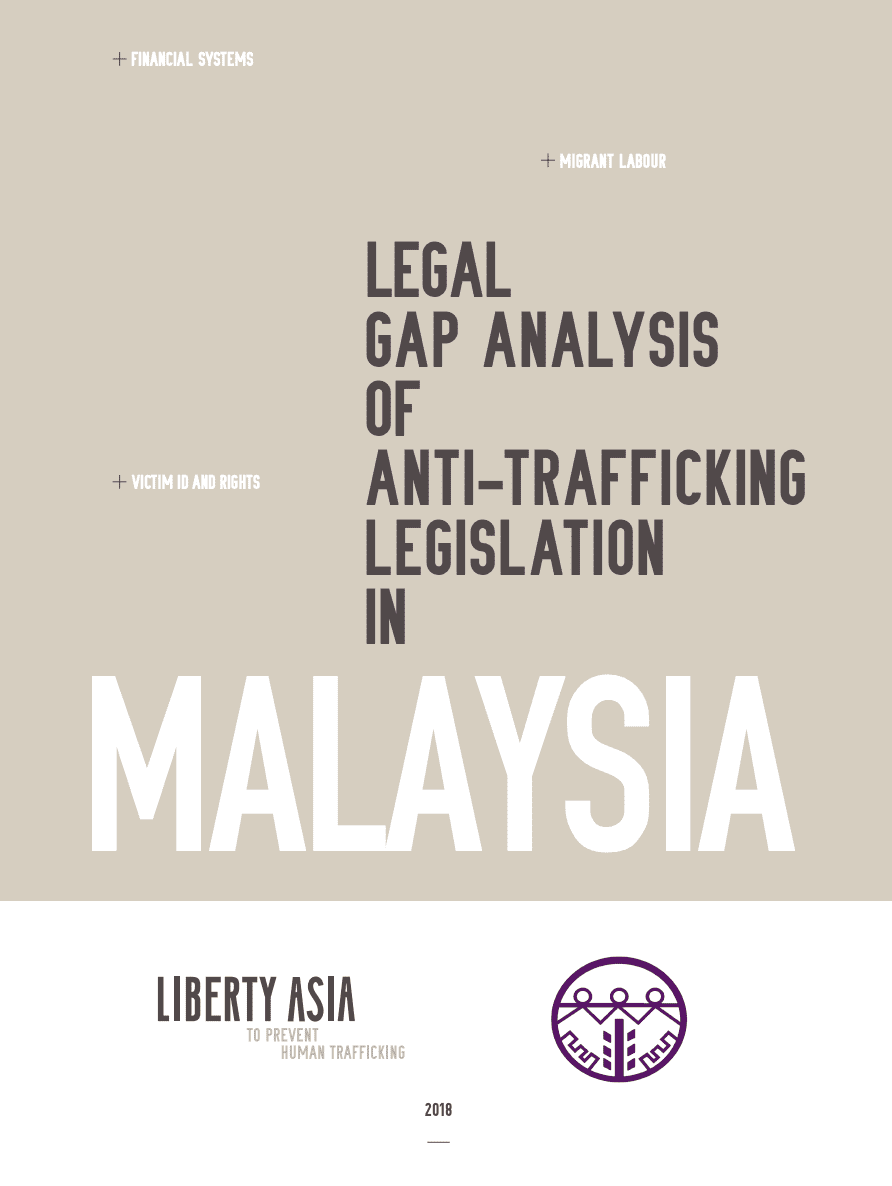
Legal Gap Analysis of Anti-Trafficking Legislation in 2018 Malaysia
Executive Summary
- Malaysia’s anti-human trafficking law incorporates provisions on smuggling that are contrary to Malaysia’s obligations under the Palermo Protocol. Human trafficking and smuggling can be closely connected, but require different law enforcement strategies. Treating the crimes of smuggling and trafficking as closely related will undermine the identification and protection of human trafficking victims.
- The definition of “trafficking in persons” has been narrowed considerably and limits the crime to those situations in which a person is exploited by means of “coercion”. The new definition is inconsistent with the Palermo Protocol, which goes beyond cases of coercion, and has the potential to leave out adult trafficking victims who are abused by using fear, psychological manipulation and debt bondage.
- Although Malaysia has fully enacted a specific antitrafficking law, six out of 35 cases were reportedly prosecuted under other laws such as the Immigration Act and the Penal Code in 2016. The Penal Code prohibits some forms of human trafficking e.g. habitual dealing in slaves and prescribes penalties that are sufficiently stringent or commensurate with penalties prescribed for the crime of trafficking in persons under the ATIPSOM.
- The understanding and application of the law would improve significantly if the concept of forced labour is formally defined in the ATIPSOM. Currently, there is a lack of conceptual clarity and also much difficulty in interpreting indicators that are relevant to this crime. Having a clear definition would help in differentiating between human trafficking and forced labour cases and to making the right decisions when it comes to the nature of the case that needs to be prosecuted and the type of evidence this warrants. In addition, concepts such as “psychological coercion” and “debt bondage” that are very common traits of both human trafficking and forced labour cases are often difficult to comprehend and apply in court especially in the absence of experts who can testify as to state of mind and the existence and impact of coercion on a vulnerable individual’s actions and psyche. Expert witnesses must be engaged in order to assist the court with making critical decisions about the existence of psychological coercion and its resulting impact.
- The amendments to the ATIPSOM expand protection and services to victims to provide freedom of movement, work authorization, transitional housing services, and a monthly stipend for victims of human trafficking. The amendments also extend the interim protection orders to allow for more thorough investigations and better victim identification. Additionally, Malaysian courts can order convicted traffickers to pay restitution to victims and even without a conviction, the courts can order alleged traffickers to pay a fixed sum for lost wages to victims.
- Gaps in Malaysia’s labor laws leave migrant workers, particularly domestic workers, without key protections. In the absence of equal protection of the laws, the vast majority of exploited migrants will continue to be mistreated as either undocumented workers or immigration detainees. Compounding the weakness of the laws, uneven law enforcement has also contributed to segmentation of the labour force and essentially established migrants as a class of workers to which a largely different set of rules apply.
- Migrant workers are often susceptible to unfair labour policies in Malaysia, leaving them highly vulnerable to exploitation. The foreign levies and the government fees for immigration processing, on top of substantial recruitment fees charged by recruitment agents, coupled with Malaysian law that allows for government fees to be initially paid by the employer and then subsequently deducted from the workers’ wages exacerbates this vulnerability and can lead to debt bondage and forced labour. The existing system makes it possible for migrant workers to be smuggled into the country, work illegally and later become “legalised” through amnesty programmes.
- Access to justice is hindered by several laws and policies that have created an imbalance of power between the employer and the worker. The policy that ties a domestic worker’s residency to the employer has restricted the workers’ ability to seek redress and change employers. Similarly, the requirement for the workers to pay for temporary Special Passes to pursue justice in cases of employment disputes essentially limit their avenues to access remedy.
- There is no specific legislation that addresses moneylaundering arising as a result of human trafficking, however, section 2 of the Anti-Money Laundering Act (AMLA) applies to serious offences, foreign serious offences or unlawful activities (past or future) and any movable or immovable tangible or intangible property or interest therein (worldwide). “Serious offences” include offences relating to human trafficking. There is no evidence to suggest that the existing anti-money laundering framework is being used to identify proceeds from human trafficking nor that prosecutions and convictions are being supported by asset seizures.
Read more here.
